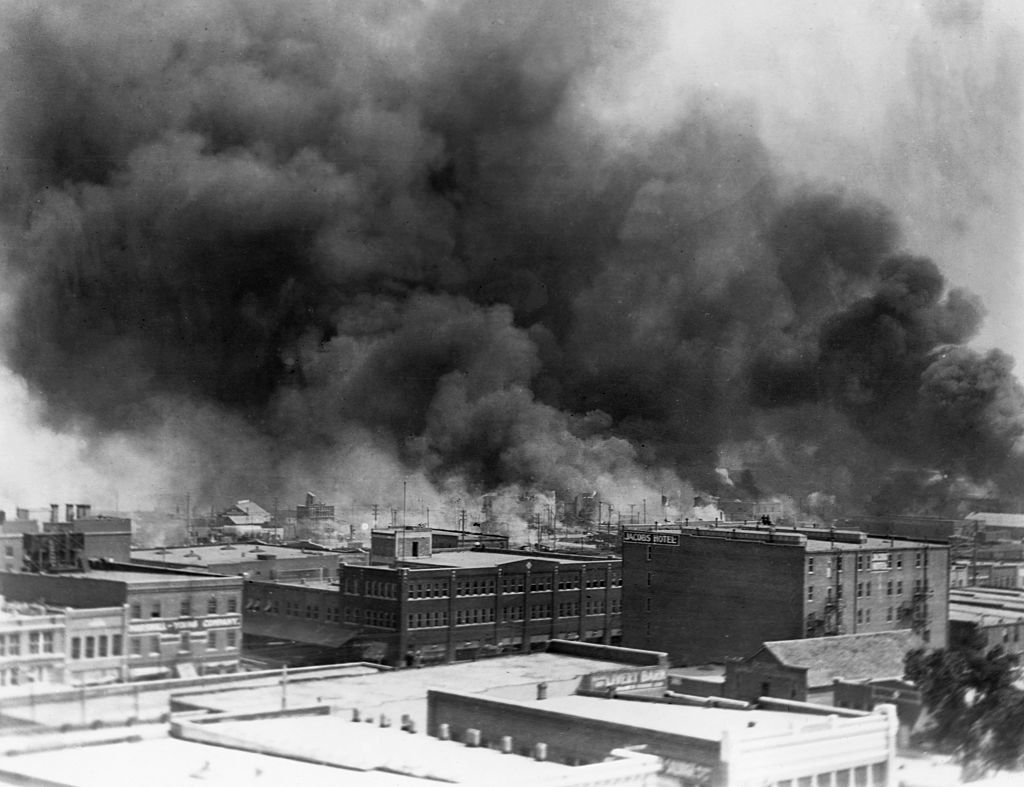New Documentary Exploring Tulsa Race Massacre Is A Testament To Black Self-Determination
Reflecting the urgency of now, a new documentary about the 1921 Tulsa Race Massacre tells the story of Greenwood from its founding to the present.
Award-winning filmmakers Stanley Nelson (“Freedom Riders“) and Marco Williams (“Banished”) teamed up to direct “Tulsa Burning: The 1921 Race Massacre.” This two-hour documentary explores the history of the Greenwood community through rare footage and interviews with noted historians, commentators, and local community leaders.
In an interview with NewsOne, Nelson said as important as it was to tell the story of the Tulsa Race Massacre, it was equally important to explore the history of Greenwood before the massacre.
“The film is also about the building of Tulsa, and it’s not just about the massacre and the destruction, but it’s also about the building of that incredible place of Greenwood,” Nelson shared. “And also it’s about rebuilding the Greenwood of today.”
Poring through the wealth of footage, written testimonials and first-hand accounts, Nelson and Williams framed the story of Greenwood through a lens of Black self-determination. Beginning with Black expansion west before Oklahoma statehood, “Tulsa Burning: The 1921 Race Massacre” provides a glimpse at Greenwood before the burn.
“We found a lot more material than we knew existed,” explained Nelson. The pair sorted through old photos and footage, including prior interviews with survivors, to provide a complete picture.
At its core, “Tulsa Burning: The 1921 Race Massacre” is the story of two Greenwoods. Once spanning nearly 40 square blocks, Greenwood was like a city within a city. Established by E.W. Gurley, the first recorded business opened in 1906.
Tulsa World reported Gurley opened a boarding house to attract Black travelers needing a safe place to rest. Soon more Black businesses and people followed.
Pre-statehood Oklahoma offered a chance for Black people to build something for themselves. That same hope and determination are seen in present-day Tulsa, where remaining survivors and descendants continue to fight for accountability.
“Being in the community and seeing what is no longer there, it was really affecting,” shared Williams. “But for me, seeing the images of the destruction of the community had the greatest impact.”
And while shows like Watchmen and Lovecraft Country have explored the horror of the massacre, it was important for the documentary team to provide an engaging story showing the full breadth of Black life.
“It’s great that Watchmen and Lovecraft country did a little bit about Tulsa, but I think in some ways fact is stranger than fiction,” Nelson said. “The factual version of what happened is even more amazing than you can fictionalize.”
Black smoke billows from fires during the Tulsa Race Massacre of 1921, in the Greenwood District of Tulsa, Oklahoma, in June 1921. | Source: Historical / Getty
One hundred years after one of the single worst attacks on American soil, the country struggles with truth and reconciliation. More than a carefully woven history lesson, Nelson and Williams lay bare all of Tulsa’s sins for examination.
Through interviews and reflections with current organizers and descendants, the film highlights the throughline from the desecration of Black life and livelihood 100 years ago to the contemporary fight for racial and economic justice.
“When we first started conceiving the project, it was before George Floyd’s murder and before the incidences of this last summer,” Nelson explained. “It became even more important that we look at our past and we understand that these incidences of racial violence have been occurring constantly throughout American history.”
While the centennial provides an opportunity to tell a complete story of Greenwood and the subsequent attack, the directors of “Tulsa Burning: The 1921 Race Massacre” do not stop at simply telling a nice story. “We make these films to make sure that our history is known and people discuss it,” said Williams.
Executive produced by NBA player Russell Westbrook, the documentary aired Sunday night on The History Channel. Like many Americans, Westbrook did not learn about the 1921 Tulsa Race Massacre until he played basketball for the Oklahoma City Thunder.
“This is one of many overlooked stories of African Americans in this country that deserves to be told,” said Westbrook in a previous statement. “These are the stories we must honor and amplify so we can learn from the past and create a better future.”
With state lawmakers and elected officials working overtime to undermine the teaching of a genuine history of America, filmmakers like Nelson and Williams can cut through the noise in a profound way. “We’re better, you know, as a country, as a world, if we confront the truth,” Nelson said. “We can’t hide from the past. We have to confront the past and move forward.”
For Williams, the documentary is a starting point for reflection and conversation. He hopes learning about Greenwood, the massacre, and the subsequent 100 years of compounded injustice motivates people to consider what mechanisms should be used to repair and restore harmed communities.
“Very specifically to Tulsa, my hope is that it influences specific conversation about restitution for the members of that community, to the living survivors and the descendants of the massacre itself,” Williams said.
SEE ALSO:
Tulsa Race Massacre Centennial Commission Abruptly Cancels Event Amid Survivor-Led Commemorations
Tulsa Race Massacre Commission Boots Oklahoma Governor For Signing Racist Legislation
[ione_media_gallery id=”3836205″ overlay=”true”]

